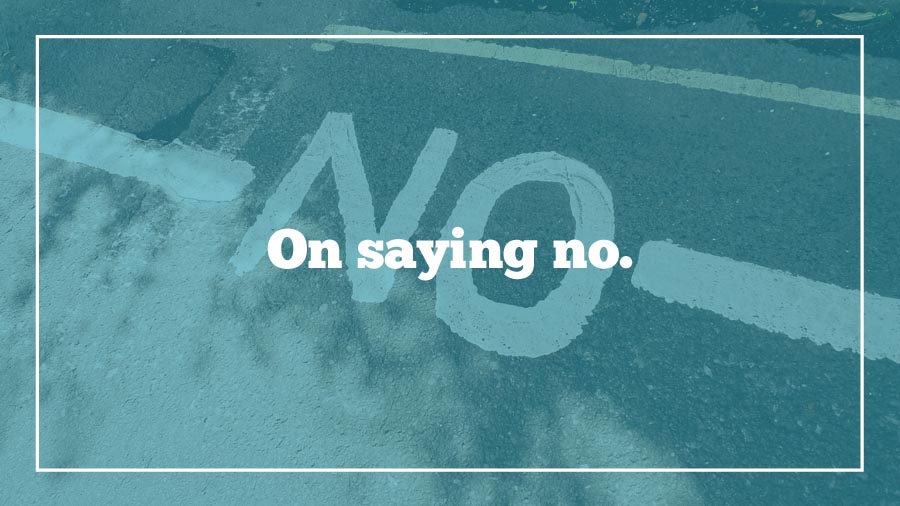
“We may be socialized to be friendly and accommodating, but nobody can do it all, and that’s why we need to protect our time by saying no, even if it’s hard.” I’m sure you’ve heard this a hundred times. That’s not what this essay is about. I’m perhaps too good at saying no.
In person, I’m really loud and outgoing. So much, in fact, that people don’t realize I’m an introvert until I tell them. But as much as I love other people, I say no to social obligations a lot. I know this makes me seem sort of chilly, but I recently told someone I keep a checklist of my friends and family members every month, and make sure to check each name off the list to make sure I’ve checked in with them recently. She was horrified that I treat my social connections “like a to-do list.” I’m just trying to stay in touch efficiently!
My work follows this same sort of “check-in” routine. Instead of scheduling myself silly trying to do all of the things at once, in February I showed you how I do a little of everything, a little at a time. The downside of a routine like this, however, is that it balances all my obligations equally. And when people invite me to take on exciting new work, it’s harder to accept than it should be.
Lately, I’ve been going down memory lane and thinking about some of the key times I said no, which could have opened up a different path in my career.
In 2013, I got an offer to work full time for Goboiano. Today, it’s the Buzzfeed of anime, but back then, it was an empty placeholder. They told me “we predict an incredible growth rate,” but I’ve heard that before, and declined. I had no inkling that in this one rare case, it would be true!
Also in 2013, I left my job at the Daily Dot. I started in 2012 as one of their first reporters. Startup life was hard. Since there weren’t very many of us, we all had to give 110% and work long hours. There were times I wrote five articles in a day, or 20 in a week! I burnt out, hard. After realizing I’d lost ten pounds purely from stress, I resigned. But today, the Daily Dot has 7 million Facebook fans and a team of dozens! I have given recommendations for journalist friends applying there, who love their jobs. I started at the beginning and didn’t stick around long enough to see the Daily Dot become something. If I had stuck around, that could have been me.
In 2015, I started writing for Forbes. In my first full month, July, I wrote an article for my Forbes blog nearly every day. But at the end of that month, when I got my paycheck of just $1,500, I decided to scale back to the bare minimum and focus my talents elsewhere. And yet, there are people who make six figures a year writing for Forbes out of pure tenacity. If I had decided to keep Forbes as my main gig, maybe I’d be making bank, too.
Also in 2015, I started interviewing for technology jobs just to see if I was still hirable. I turned down a full-time job before deciding on my part-time web developer job. If I had picked the former, I would have a large, steady source of income right now and, better yet, a clear divide between work and play—I’d work at the office and relax at home. If I hadn’t said no to a traditional job, would I be happier right now?
Right now, I am on the cusp of a major project launch that I’ve been working on all year (more on that Friday). For weeks, I’ve spent the majority of my free time in my apartment, combing through data and planning a launch schedule. I’ve invested a lot of time and money into this and I’m at the same point I was with these pivotal “no’s”: I have no idea if this will pay off. My “no’s” come from uncertainty, from mistrust, and ultimately, from fear. My fear of wasting my time on something that doesn’t work out is stronger than my fear of missing out.
The “no’s” in my life are what might have been. But the “yes’s” are the branches that formed who I am today. I said yes to journalism graduate school. I said yes to a job as a technology writer, which in turn reminded me that I’ve always liked tinkering with computers, and that I wanted to build those skills on a professional level. I said yes to learning Japanese at the advanced age of 27, and making it a priority to visit Japan. And of course, every time I write here, I’m saying that yes, writing regularly online is one of the most important things that I do, a sole consistent thing in my life over the past six, almost seven years!
Before I say yes to something on I ask myself:
- Will this work be something I’d be proud to add to my portfolio?
- Does this work factor into a subject or community that I care about?
- Will this work teach me something new?
And before I say no, I ask myself:
- Will this work negatively affect my health and mood?
- Will this work keep me from working on something that truly matters to me?
- Before I move on, have I learned all I can from this work?
Nobody knows the future. We never know if today’s decisions will lead to satisfaction or regret. The only thing we can do is move forward, and choose work that helps us do that.
Photo by Henry Burrows
